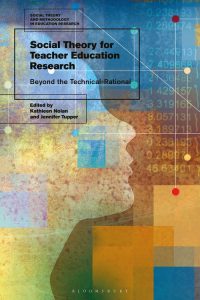
Source: https://www.bloomsbury.com/uk/social-theory-for-teacher-education-research-9781350086395/
Teaching for 3 Cs: centring imagination in teacher education.
Abstract
Current teacher education practice and theory has a strong emphasis on practical activities, teaching methods and behavioural management strategies. This may indicate a response to the demands of existing curricula and dominant modes of assessment, which in turn suggest the influence of neoliberal globalisation on education that has led to a disproportionate emphasis on instrumental interests of reason, thereby privileging certain forms of knowledge over others.
We believe, omitted from many teacher education programmes is a concern with ethics and empathy and the understanding of education as the holistic development of children and not the mere transmission of knowledge. To redress this situation, drawing upon Mills’ (1959) concept of sociological imagination and Nussbaum’s (1997) narrative imagination, we propose an innovative approach to teacher education, one that seeks to promote teachers’ imagination.
Sociological imagination is the capacity “to grasp history and biography and the relations between the two within a society” (Mills, 1959, p. 5) and narrative imagination is the ability to be an intelligent reader of another person’s story (Nussbaum, 1997, p. 11). We argue that teachers need these imaginative capacities to carry out their responsibility of understanding students and helping them (students) grasp the relationship between individual and society. This makes educating imagination of teachers central to the practice of teacher development, as it can provide the grounding teachers require to better understand students’ needs in today’s world.
Building on the theoretical explorations along the above line, the chapter will also offer reflections on how imagination can be nurtured in the practice of teacher education. This can include developing trainee teachers’ academic capital, their empathy and emotional intelligence, their understanding of relationships between school and society, and their ability to link curriculum with wider political, social, historical issues. We believe addressing the role of imagination in teacher development can open new vistas for practice and research.
Reference:
Panjwani, F. & Brown, N. (2020). Teaching for 3 Cs: centring imagination in teacher education. In: Nolan, K. & Tupper, J. (eds.). Social Theory for Teacher Education Research: Beyond the Technical-Rational. Bloomsbury. 105-124.
Leave a message: